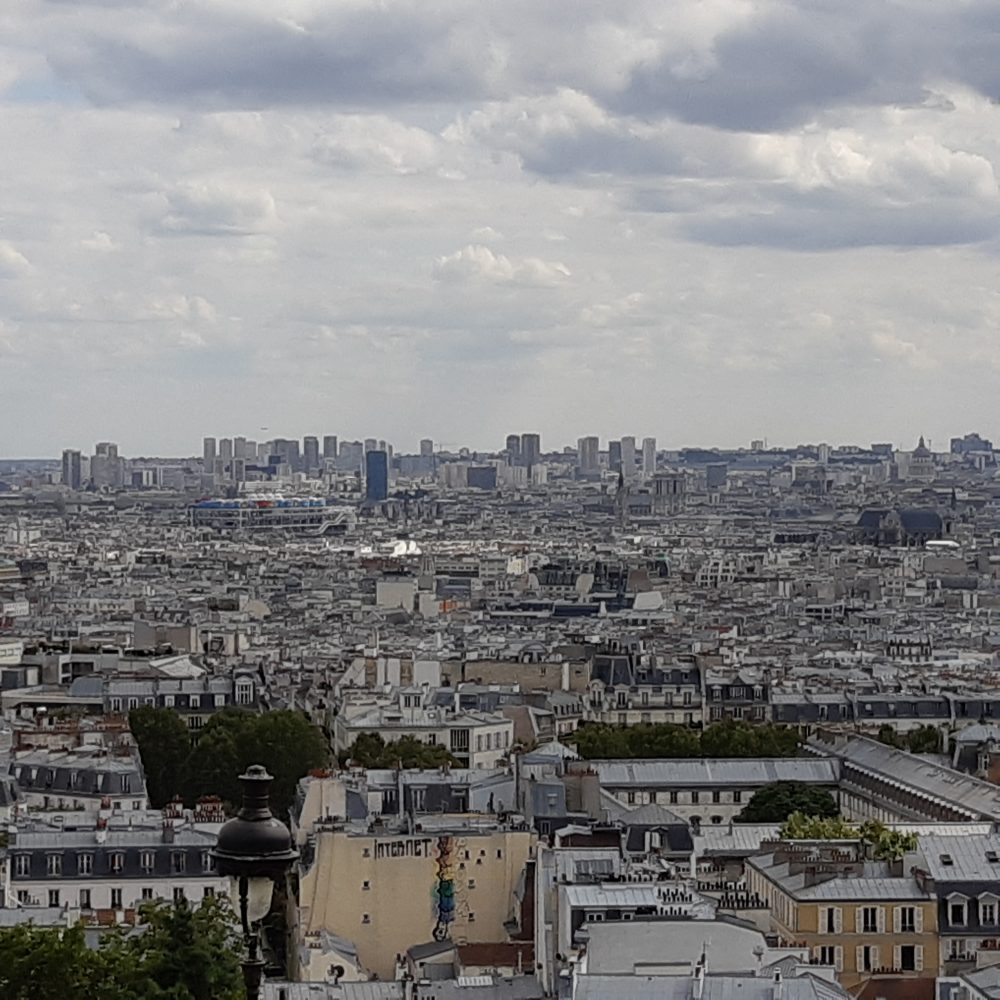I had this romantic notion on the pilgrimage of sailing away from my native land, watching the ‘white cliffs of Dover’ recede into the distance, so planned to catch the ferry between the mediaeval port town on the south coast of England and the French port-town of Calais. After leaving Canterbury on the earliest train, I arrived in Dover, and went looking for a place to mail a letter, keeping the direction to the ferry vaguely in mind. I went randomly down a side-road and there, where one would least think to look, emerging as though from the darkness, was the iconic, bright red beacon of Her Royal Highness’ Post Box.
By now, I was a bit lost, so began to make my way to the ferry terminal, going sort of in the right direction, pack weighing on my back, praying I would make it. A fellow came out of his house, and I asked him for directions. He began to describe the way in a friendly manner, as the British often did, but then offered to take me there, as he was a taxi driver, free of charge. God does send His angels, for the terminal was far farther away than I had thought.
Watching the white cliffs of Dover recede from the ferry was just as I imagined it, bittersweet as I stepped off the coast of the land of my birth. I thought of all the young men in the last World War, packed into those great iron ships as they approached Normandy, and how that would the last many of them would ever see of their native land. Perhaps the same with me, if not in the same way.
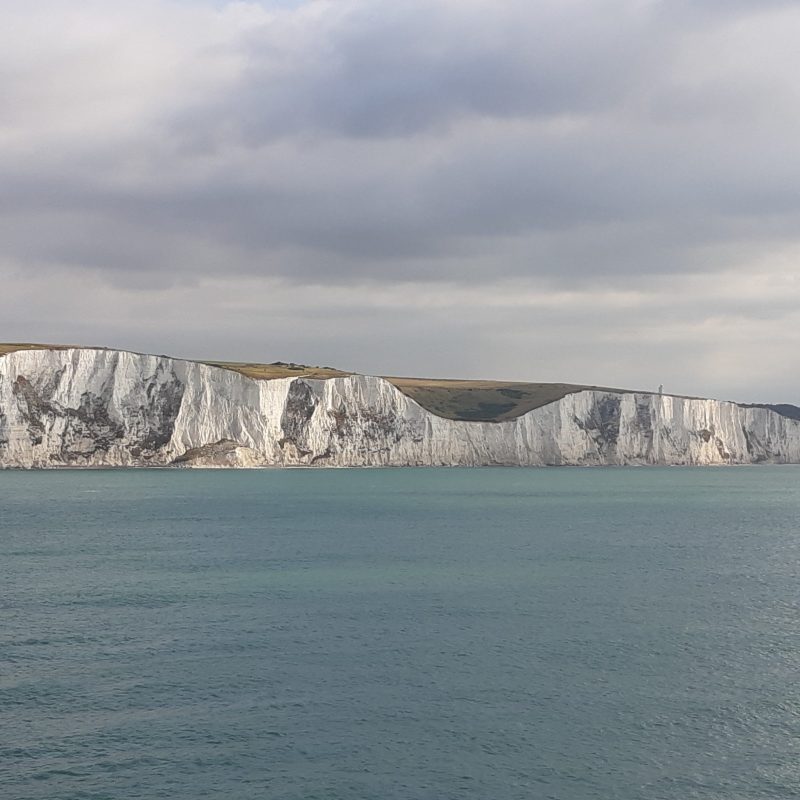
I met an older Australian couple on the ferry, who were also going to Paris, and offered to share the taxi to the station. Good thing, for the ‘Calais-Frethun’ station was actually miles and miles away, in ‘Frethun’ and nowhere near ‘Calais’; the cab ride cost almost as much as the TGV (train grande vitesse, the 250 km/hour fast-speed rail) all the way to Paris.
Ah, Paris, with all of its own romantic connotations, its historical sites stretching back beyond the Middle Ages. Yet upon first impression, Paris is stiflingly hot, dirty, crowded, noisy, brutish, filled with never-ending streams of tourists, mingled with countless others hawking goods and touristy kitsch; besides these, there are any number of listless, sullen-looking men, apparently jobless, talking on mobile phones, talking in groups, and I kept wondering, what do they talk about? Saint Thomas describes delightful conversation, which he calls by its original Greek term of eutrapelia, the highest form of recreation, based on the love of wisdom, philo-sophia, the basis of our culture.
But, forgive me, I don’t think these conversations were all that ‘delightful’, nor filled with wisdom. I wondered what these men thought of the smug, semi-bored tourists, whose money and lifestyle they so desire, and for which they so often abase themselves?
But I did not dally, for I was there for spiritual reasons, and went straight to the nearby basilica of Montmartre, dedicated to the Sacred Heart (whose feast Blessed Pius IX proclaimed in 1856). The massive, imposing structure, built between 1875 and 1914, on top of the hill overlooking all of Paris, on a site where Saint Ignatius first formed the Jesuit, and where they have had perpetual adoration since 1885. The Blessed Sacrament has quite literally overlooked the entire city for a century and a half.
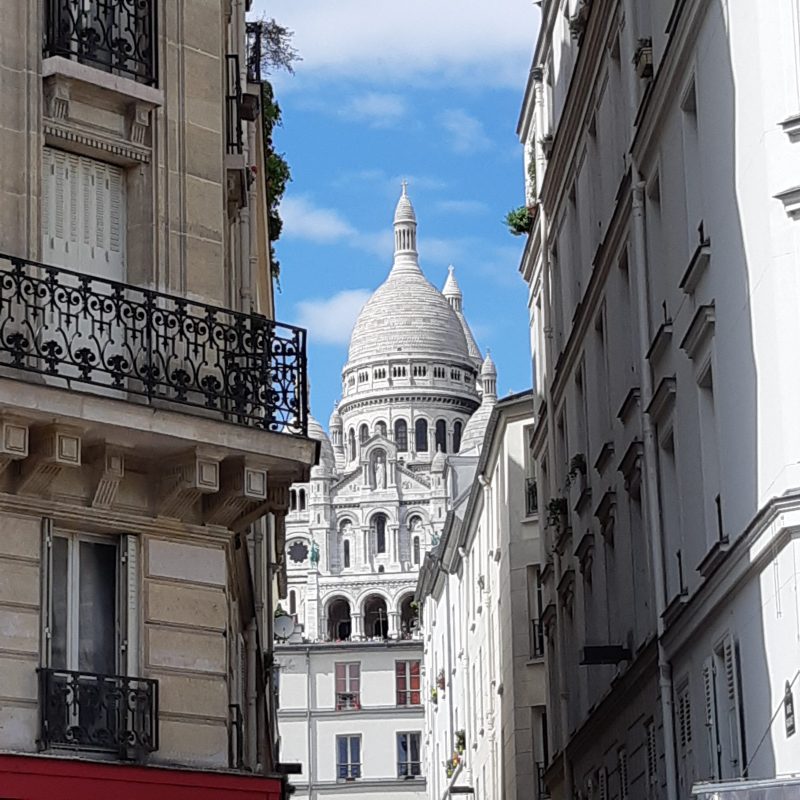
The basilica has a tradition where they will give you a bunk in exchange for one hour of adoration, and I had booked ahead for a spot. So after evening Mass, I went into the office to officially sign up, and there discovered that, due to omni-present security regulations, they not only lock everyone out of the basilica from 11 p.m. until 6 a.m., but also lock everyone else in, leaving me no time to catch the 6:37 train I had booked to Rome, departing from Gare du Lyon, a station miles away.
The rather brusque woman in charge would make no exceptions, even to open the door a crack and let me out at, say, 5. No go. Manners here, especially for tourists, are not a high point, and one may understand why, when one sees the seas of people all wanting something.
The lovely Sister, who took over after her, was more gracious and very sympathetic, but, alas, stuck to the same policy. Again, security and bureaucracy. So out I wandered, homeless and alone in Paris. By this time, it was after 9 p.m., and I thought, well, I can survive until 4 a.m., when the station opens (they close the train stations between 1 and 4 a.m., to keep out the legions of homeless).
And so began to make my way down the hill, vaguely towards the iconic Basilica of Notre Dame. As Thomas Jefferson once said ‘a walk about Paris will provide lessons in history, beauty and the point of life‘. Hmm. Perhaps, but I don’t think he was thinking of walks in the middle of the night.
Soon after beginning my wander, I stumbled upon a beautiful mediaeval-esque church, seemingly abandoned (as so many seem to be) and stopped to say a prayer. It was only as I began to walk away that I noticed it was dedicated to Saint Lawrence, whose feast was two days away, on which I happened to be born. Another gift, so I stayed to pray Compline.
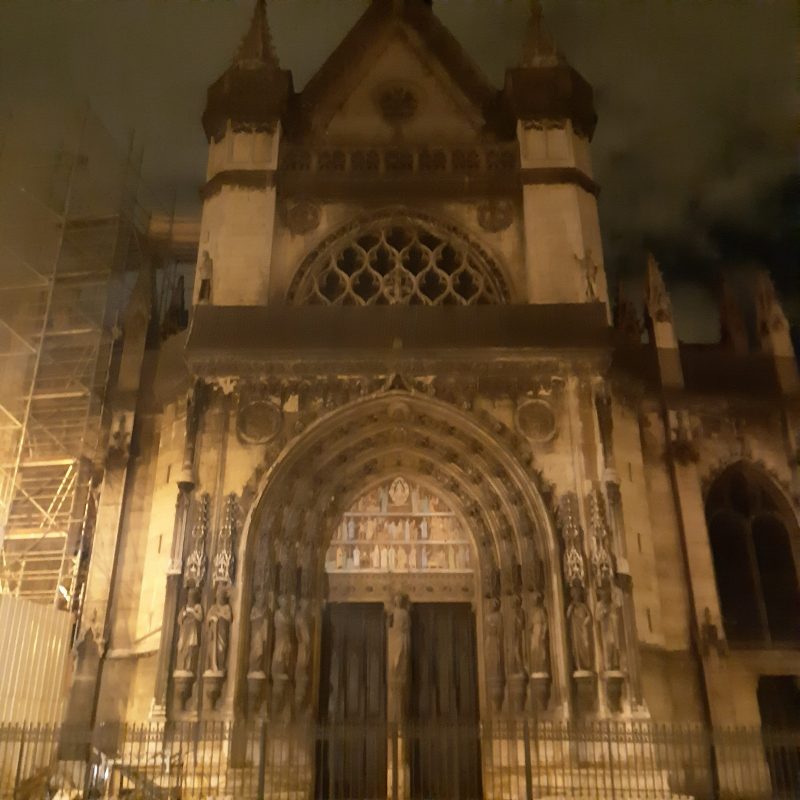
As I was finishing up the final Collect, a lovely young-ish couple stopped by, asking questions about the church and the statuary, which I answered. (They described themselves as spiritual, but not religious, but one begins with what one has). When I described my pilgrimage, they were intrigued and supportive; the man even offered to pay for a hotel room across the road, which looked lovely and, at this point, very, very inviting. I was sorely tempted to accept, but in the spirit of pilgrimage, gratefully declined.
So off I went, setting my face for Notre Dame, in my mind a kind of refuge, hauling my pack like some modern Quasimodo. After a brief refuge in a McDonald’s, writing a bit, I sought somewhere that could provide a snatch of sleep; as I walked, and the hours got late (or early), I witnessed hooligans and vandals, even of the near-demonic variety, darkness, exhaustion, but also angels and friends. I came upon a large courtyard, dedicated to ‘the Republic’, where people were dancing. I was tempted to join them, but, exhausted, sweaty and not feeling much like a dance partner to myself, nor to anyone else likely, lay down on my pack. As I drifted off, a Turkish man offered me a shot of Ballantyne’s scotch, a blended variety that used to be distilled in my hometown in Scotland. Not by any means my favourite (I could have done with some Lagavullin) but we homeless take what is offered, and it was, after all, a taste of home.
Eventually, off I went again, passing by a large sign declaring the upcoming ‘Gay Games’, in which athletes, I presume, must be ‘gay’ to compete; but I wondered, how one would know the athletes are ‘gay’, and are there not already any number of ‘gay’ athletes in the ‘real’ Olympics, closeted or ‘out’? There were large photos of said athletes in various action poses, who might, or might not, have ‘looked gay’, if one is even allowed to say that. Twenty years ago, this would have been a comedy skit in a futuristic dystopia, but is now all-too-real in an all-too-fake world. Such were some of my early-morning thoughts, amongst numerous others…
As I mulled, the serenity of the ineffable façade of the mediaeval cathedral rose into view, lit up like a ensign in the night, a fitting last sight of Paris.
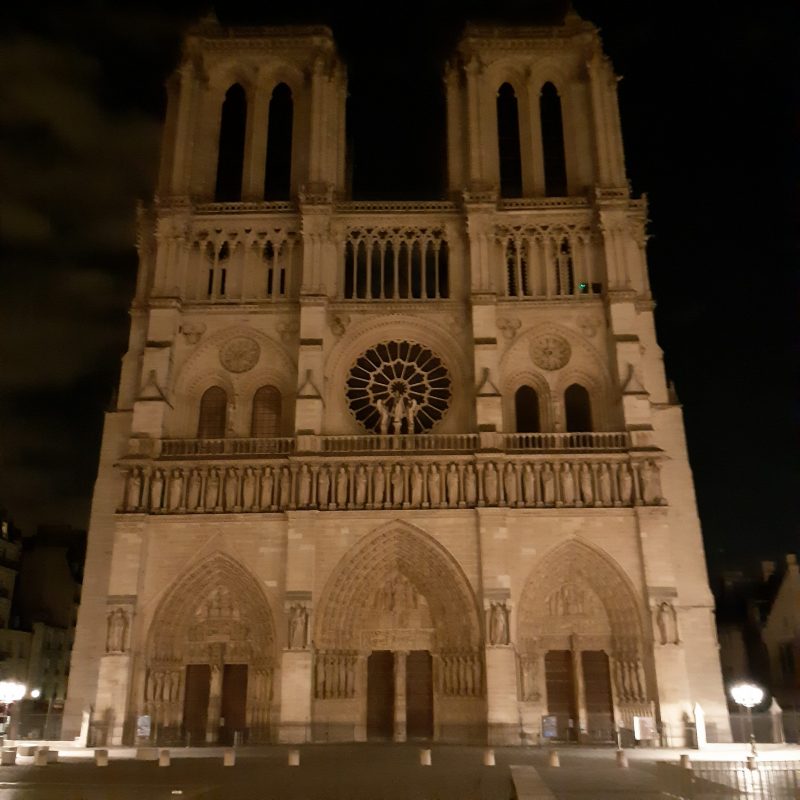
As I marvelled at what Faith it must have taken to build such a structure, and how much that Faith has receded, I noticed packs of rats skittering about the vast stone courtyard in front of the cathedral, some as large as gophers, chattering and gnawing the garbage and anything else they could find. As I lay down on a stone bench to rest, I thought, I hope they haven’t developed a taste for what I imagined would be (to them) the scrumptious flesh of a human face.
But I could scarcely sleep, and not just because of the rats. Numbers of angry, drunk men of various races and types, kept wandering in and out of view, yelling at each other in what I took to be a rather guttural form of French or Arabic, or a mixture of the two (Frabic? Arench?). I seemed invisible to them, by the grace of God, but the potential for violence was real enough.
The contrast between the courtyard and the church was startling, an image of something.
With thoughts such as these, I made my way toward Gare du Lyon, along the wide walkway overlooking the Seine, lovely in its own way, more so in other circumstances. There were other meetings, a young couple about to get married, for whom I promised to pray; two Irish colleens, stranded, waiting for a potentially disastrous Über ride that was not showing up, for whom I hailed a taxi.
I finally made it to the station, where I rested, staying alert enough to stop someone who was, of all things, apparently trying to steal my Seat of Wisdom hoodie. One gets very jealous of one’s goods when one is reduced to living out of a backpack. The young man feigned surprise that the sweater was mine, and in my groggy state, I at first thought he was actually interested in what the College had to offer, and was intrigued by our Veritas vos Liberabit motto. Perhaps I should have just let him have it, and I will leave you with that ambiguity.
Such was at least my walk-about Paris, and I did learn a few things, as Jefferson said: Grace and sin, light and darkness, in constant conflict, and a city that will not be the same in a scant few years. A recent article I read described that there are vast shantytowns metastasizing around the edge of the city, already blighted with vast, unsightly concrete bailieux where uncounted numbers of semi-or-un-empoyed immigrants eke out what existence they might.
Such is the entropic tendency of socialist economies: the wealth ever-more concentrated in cities, amongst a politically connected urban few, while the vast swathes of the poor gather around the megapolis, hoping to gather a few crumbs from their masters’ tables.
But masters for how long? Will the cauldron boil over? As things now stand, the future of Paris, of Europe for that matter, is bleak indeed, a demographic implosion already underway, with all that entails, and millions of immigrants who share not their once-vaunted-and-beloved religion and culture, waiting at the door.
All, however, is tinged with some hope, at least of a supernatural variety; for, as I kept reminding myself, Christ in the Sacrament watches over all. If we lose faith in that, we lose faith in everything.
